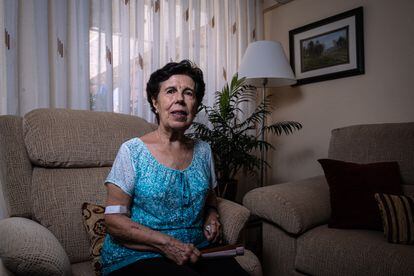Lina Pozuelo, "war girl", at her home in Madrid.ALEX ONCIU
The sanctions that the European Union imposes on Russia can punish the most innocent.
This is what happened last month to dozens of
war children,
minors evacuated from Spain during the Civil War and sent to Russia.
Already older and returned to Spain, in June they stopped receiving their meager Russian pension.
CaixaBank and other financial entities considered that the transfers from a Russian public body (the Pension Fund) were included in the sanctions and returned them to Moscow.
The Spanish Ministry of Economy clarified this Friday that payments could continue to be made.
More information
The blockade of Russia leaves several Spanish 'war children' without a pension
These are very small quantities.
Russian pensions are about 500 euros per quarter, which, thanks to an agreement reached in 1993 by the governments of Moscow and Madrid, the Spanish Social Security supplements until reaching the minimum pension: 689 euros per month.
With this live elderly people who have had a very difficult life.
Like Honorina Fernández, evacuated from Gijón in 1937, at the age of 12, a field nurse during the battle of Stalingrad (1942-1943, the bloodiest in history, with two million dead), later graduated in medicine, sent to Cuba as pediatrician after the Castro revolution.
Honorina returned to Spain in 1991 and now, at 97 years old, she lives in a nursing home.
She did not find out that her pension had been interrupted.
For the legal office of CaixaBank, the matter was clear.
The transfers could not be paid “because of the sanctions imposed by the EU on Russia after the invasion of Ukraine.
These transfers are issued by a Russian public body and this operation is expressly prohibited by the sanctions regulations,” a spokesperson for the entity told EL PAÍS last Thursday.
The Russian bank that makes the transfers to Spain is Gazprombank, the financial subsidiary of the gas giant, which further complicated the matter.
Other entities, such as Unicaja or INGDirect, adopted the same line: pension transfers were returned to Russia.
In contrast, other banks, such as Santander and BBVA, were of the opposite opinion and did not stop payments.
A BBVA spokesman stated on Thursday that the pension beneficiaries were Spanish citizens and the bank therefore considered that the sanctions imposed on Russia did not affect them.
Dealing with a bank is not easy, especially when you are elderly.
Lina Pozuelo, daughter of the communist leader Nemesio Pozuelo, traveled with her parents to Russia in 1939 when she was only three years old, and she returned to Spain in 1992, after 36 years of work in Russian publishing houses.
Now a resident of Madrid, since she did not receive her pension, she tried to file a claim at the CaixaBank branch, but her protest was not accepted.
She told him to send her an email.
Subsequently, Lina Pozuelo received a letter from the director of her branch, dated June 30, informing her that CaixaBank "does not offer unlimited and unconditional service for all types of transactions", and that "the specific referred transaction [the transfer of his Russian pension corresponding to the months of April, May and June] does not fit the current criteria”.
Lina's brother, Nemesio Pozuelo, born in 1940 in Járkov (a city that now belongs to Ukraine and between February and April suffered harsh Russian bombardments), is also a client of CaixaBank and also stopped receiving his pension.
Nemesio Pozuelo is a very popular man in Russia: he played as a striker for Torpedo and Spartak, two teams from Moscow, and in 1972 he was the top scorer in the Soviet League.
Through its website, the Russian Pension Fund declared itself informed of the problems with the transfers and published a statement last week: “Given the impossibility of transferring pensions and other premiums abroad and the lack of a request from the interested in being paid on the territory of Russia, payments will be suspended.
After the lifting of the restrictions of an economic nature (…) the payments will be restored with the bonuses for the elapsed time provided for by the legislation of the Russian Federation and the international agreements of the Russian Federation”.
The Spanish government, through a decree-law of April 27, created mechanisms so that, despite European sanctions, citizens who received a Spanish pension in Russia and Ukraine (about 20 people) could receive it through the consulates in Moscow and kyiv, as well as payments to insurers (Spasskie Vorota and Krayina) that provide medical assistance to these pensioners.
But that was only useful for those who still lived in Russia and the Ukraine.
The situation was definitively resolved on Friday, July 15, when the Spanish Ministry of Economy included Russian pensions within the exceptions to the sanctions of the European Union.
50% off
Exclusive content for subscribers
read without limits
subscribe
I'm already a subscriber

